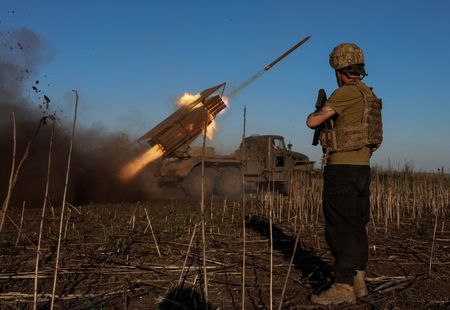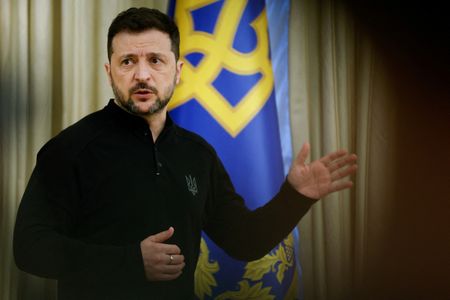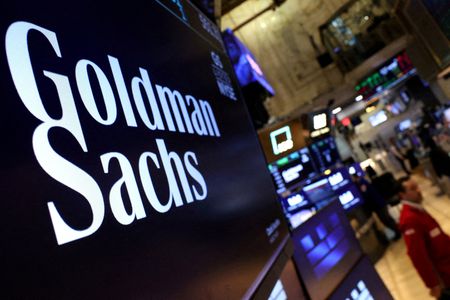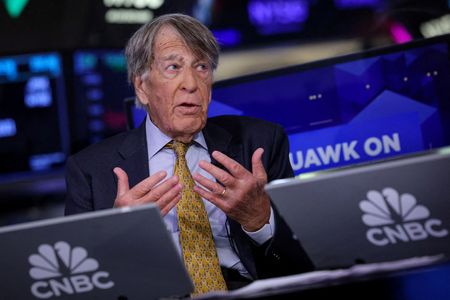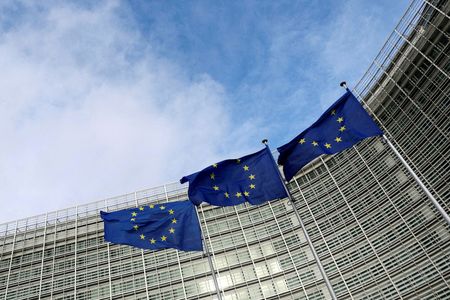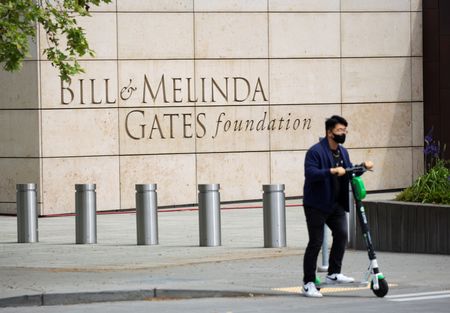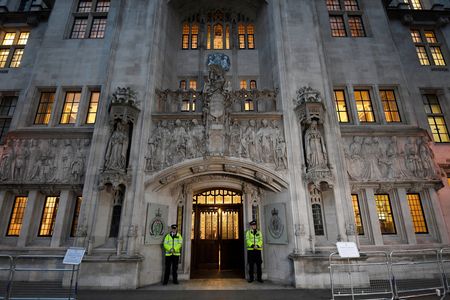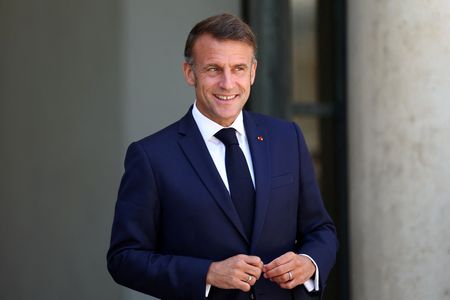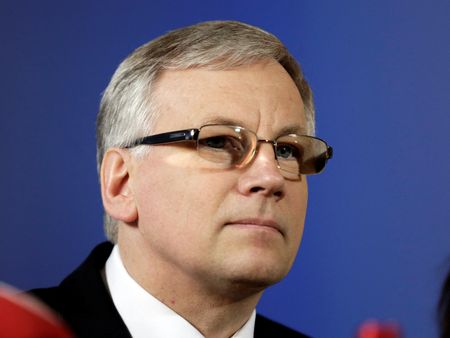By Doina Chiacu, Elizabeth Piper and John Irish
WASHINGTON/LONDON/PARIS (Reuters) -U.S. President Donald Trump and Ukrainian President Volodymyr Zelenskiy clashed again on Wednesday on efforts to end the three-year-old war in Ukraine, with the U.S. leader chiding Zelenskiy for refusing to recognize Russia’s occupation of Crimea.
Trump’s Vice President JD Vance said it was time for Russia and Ukraine to either agree to a U.S. peace proposal “or for the United States to walk away from this process,” echoing a warning from Trump last week.
Speaking to reporters in India, Vance said the proposal called for freezing territorial lines “at some level close to where they are today” and a “long-term diplomatic settlement that hopefully will lead to long-term peace.”
“The only way to really stop the killing is for the armies to both put down their weapons, to freeze this thing,” he said.
A former Western official familiar with the U.S. proposal said it also called for the recognition of Russia’s annexation of Crimea.
Since taking office in January, Trump has upended U.S. policy toward the war in Ukraine, pressing Ukraine to agree to a ceasefire while easing pressure on Russia, which launched a full-scale invasion of its neighbor in 2022.
Zelenskiy on Tuesday reiterated that Ukraine would never cede Crimea to Russia, which seized control of the peninsula in 2014 in a move that was condemned internationally. “There’s nothing to talk about here. This is against our constitution,” he said.
Trump, who argued with Zelenskiy in a disastrous Oval Office meeting in March, called this an inflammatory statement that made peace harder to achieve. He said in a social media post that Crimea was lost years ago “and is not even a point of discussion.”
Zelenskiy acknowledged later in an X post that the London talks among U.S., Ukrainian and European officials were marked by high emotions but expressed hope that future joint work would lead to peace.
He pledged again that Ukraine would abide by its constitution and said he was sure Kyiv’s partners, in particular the United States, “will act in line with its strong decisions.”
He attached to his post a 2018 Crimea Declaration from Mike Pompeo, Trump’s secretary of state during his first term, which said: “The United States rejects Russia’s attempted annexation of Crimea and pledges to maintain this policy until Ukraine’s territorial integrity is restored.”
Trump, who promised during his election campaign to end the war within his first 24 hours back in the White House, scolded Zelenskiy and said on Truth Social the U.S. was trying to stop the killing in Ukraine and that they were “very close to a deal” for peace.
Trump told reporters later he thought the London talks had gone “pretty well,” although he also said, in apparent reference to Russian President Vladimir Putin and Zelenskiy: “We’ve got to get two people, two strong people, two smart people, to agree. And as soon as they agree, the killing will stop.”
U.S. Secretary of State Marco Rubio cancelled his trip to attend the London talks, prompting cancellation of a broader meeting with foreign ministers from Ukraine, Britain, France and Germany and underscoring the gaps between Washington, Kyiv and its European allies over how to end the war.
TRUMP’S ‘PATIENCE IS RUNNING VERY THIN’
White House spokeswoman Karoline Leavitt told reporters Trump is “frustrated” with the pace of talks and that Zelenskiy “seems to be moving in the wrong direction.”
Several sources have said proposals from Trump’s envoy Steve Witkoff include not only recognizing Russia’s annexation of Crimea, but accepting Russia’s control of the 20% of Ukraine’s territory it has gained in the war, ruling out Ukrainian membership of NATO and lifting of Western sanctions.
Trump’s Ukraine envoy Keith Kellogg said on X that there were positive talks in London with Zelenskiy’s chief of staff, Andriy Yermak, and added: “It’s time to move forward on President Trump’s UKR-RU war directive: stop the killing, achieve peace, and put America First.”
Trump raised the pressure on Sunday when he said he hoped Moscow and Kyiv would make a deal this week to end the conflict.
At the heart of Wednesday’s talks was an attempt to establish what Kyiv could possibly accept after Witkoff presented proposals to a similar session in Paris last week. Three diplomats said those proposals appeared to demand more concessions from Ukraine than Russia.
TRUMP ENVOY EXPECTED TO MEET PUTIN ON FRIDAY
Witkoff is expected to meet Putin again on Friday, a U.S. official told Reuters.
Witkoff has already met Putin three times to discuss prospects for an end to the war and will visit Moscow this week for a new round of talks, the White House said earlier.
Since Trump expressed his desire to broker peace in Ukraine and made a surprise call to Putin in February, European nations have scrambled to find ways to support Kyiv against Moscow while keeping the U.S. onside.
A joint statement from Britain, France and Germany after the London talks said all parties had reiterated strong support for Trump’s “commitment to stopping the killing and achieving a just and lasting peace.”
It said “significant progress was made on reaching a common position on next steps” and “all agreed to continue their close coordination and looked forward to further talks soon.”
(Reporting by John Irish in Paris, Elizabeth Piper, Daphne Psaledakis and Tom Balmforth in London; Additional reporting by Erin Banco, Jonathan Landay, Steve Holland and Gram Slattery in Washington and Yuliia Dysa, Anna Pruchnicka and Max Hunder in Kyiv; Writing by David Brunnstrom, Liz Piper and Kate Holton; Editing by Humeyra Pamuk, Alison Williams, Ros Russell, Mark Heinrich, Cynthia Osterman and Daniel Wallis)

